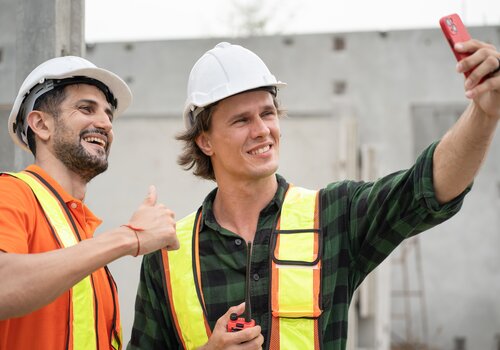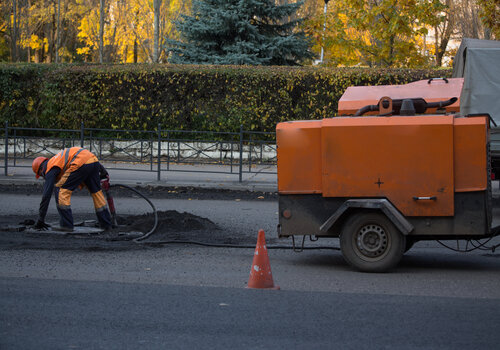If you are in a mental health crisis, call or text 988 to speak to a crisis counselor now. You can also text HOME to 741741 to reach the Crisis Text Line and speak to a live, trained crisis counselor. Learn more about the Suicide & Crisis Lifeline 988.
When it comes to mental health on the job site, men and the construction industry are at odds. There is a certain stereotype that men must be stoic and tough. Throw those men on a construction site where the days are long, the weather is unpredictable and mistakes using equipment can be lethal and the need to be tough is multiplied almost infinitely.
Off the job site, men die by suicide four times more than women and research confirms what we all know: there’s a stigma with men discussing mental health. Men are much less likely to seek resources for help because of this stigma. Add that on top of the fact that the construction industry is physically and mentally taxing, it sadly makes sense that construction has high rates of suicide.
However, the good news is that is changing.
I was just hopeless and in a state of desperation where I had the willingness to change, but I didn't know how. These people helped me see a different way of living.
Denis Cashman
co-owner, Stone etc. Ltd.
THE PATH TO DESTIGMATIZATION
“The number of presentations that we're getting asked to do on mental health has increased exponentially over the last couple of years,” says Jessica Bunting, MPH, director, research to practice (r2p) at CPWR – The Center for Construction Research and Training. “[Leadership and contractors] see a need for it. So, I think that we are on a good path to destigmatization.”
Organizations like CPWR and CIASP provide documentation for leaders who want to implement mental wellness formally into their business plans and safety talks. Programs like Repurposed Educator’s Culture Academy help leaders build a healthy company culture, focus on team building and encourage professional development.
Denis Cashman, co-owner of Stone etc. Ltd., has spent the past few years as an advocate for mental wellness. He tells his story candidly because he knows first-hand how much that can help the next person in need.
“Through my experience, through what addiction and alcohol use have done to me, I was given the gift of desperation and a brief moment of grace where for the first time, I was able to sincerely ask for help,” Denis says.
EAPs and health company culture are excellent and necessary, but people also need human connection. The best help Denis received came from talking to other people in his situation. So, he got online. Denis searched for help with his addiction online and started looking into different support groups. Soon, he found one that was the right fit for him.
“I started to develop this network of like-minded people that thought like me [and] drank like me. The only difference was today they were sober, happy, joyous and free,” Denis says. “I was just hopeless and in a state of desperation where I had the willingness to change, but I didn't know how. These people helped me see a different way of living.”
Stories like Denis’ are bittersweet. On the one hand, it helps to know you aren’t alone in your struggles. On the other, it hurts to know that so many people struggle with addiction and mental illness. But the silver lining to so many people sharing these kinds of issues is we’re that much closer to breaking the stigma. If everyone is struggling and everyone is being honest about that experience… What’s the point in maintaining a stigma?
This is when we start to consider emotional intelligence and maturity. In the U.S., men aren’t encouraged to self-reflect. It’s usually not until a point of despair, like in Denis’ story, that men realize something must change – and then must act on that.
“I thought I could handle the situation. I thought it was an issue of willpower. I think in construction, you've got a lot of this persona where [you think], ‘I can do it. I can get it done,’ and if you can't, then it reflects negatively on your character,” Denis says. “With addiction and mental health – to a certain extent – I cannot rely on my willpower to stay sober and to recover. I needed the help of other people. I needed the help of something else. I needed to change completely so that I could live a sober life and recover.”
HOW AND WHEN TO TALK ABOUT MENTAL HEALTH
When we have conversations about encouraging men in construction to talk about their feelings, there is this notion that we mean getting to the job site and pouring out every emotion you’ve had to hold in for your entire life. That’s not the case. If you are on the job site and need to take a break – do exactly that. After you’ve built up your network, communicate with someone you trust. It’s common for colleagues to become friends, but no one expects you to relay your feelings to the entire crew.
“There is this thought of, ‘Men don't talk about their mental health,’” says Max Margolis, program director, Construction Suicide Prevention Partnership. “But they show care. There are conversations that are happening. It may not sound like, ‘Hey, I'm focusing on your mental wellness right now,’ but there is support among people. They’ve got each other’s backs. They care about each other, and it's about making sure we are there speaking like that.”
The bottom line is that mental health should be treated like any other type of health on the job site. If you break your arm and cannot operate a certain piece of equipment because of that injury, no one expects you to “just power through it” and do it anyway because it is a safety concern for everyone. So, if you are struggling with depression, anxiety or any of the dozens of mental health concerns and it affects how you safely perform a job, no one expects you to “just power through it.”
“This industry is tough and caring about each other is a tough thing to be able to do,” Max says. That's brotherhood.”
Content Note: The CONEXPO-CON/AGG 365 newsletter will feature content about mental health over the course of the next few months. While these topics can be challenging, we want to remind you about one underlying feature: hope.
We will tackle topics related to suicide, PTSD and other mental health conditions that are prevalent in the construction industry. There are resources to help – whether you need help yourself or want to help a friend. Where there is help, there is hope.
One way to attack the mental health stigma is by telling your story. Please contact us if you would like to share your journey with fellow CONEXPO-CON/AGG 365 readers.
Photo credit: RAFAEL BEN ARI/BIGSTOCKPHOTO.COM












